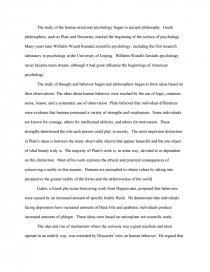History of Psychology
Essay by mistywhitehead85 • April 2, 2013 • Essay • 774 Words (4 Pages) • 2,184 Views
The study of the human mind and psychology began in ancient philosophy. Greek philosophers, such as Plato and Descartes, marked the beginning of the science of psychology. Many years later Wilhelm Wundt founded scientific psychology, including the first research laboratory in psychology at the University of Leipzig. Wilhelm Wundt's Gestalts psychology never became main stream, although it had great influence the beginnings of American psychology.
The study of thought and behavior began and philosophers began to form ideas based on their observations. The ideas about human behavior were reached by the use of logic, common sense, reason, and a systematic use of observation. Plato believed that individual differences were evidence that humans possessed a variety of strengths and weaknesses. Some individuals are known for courage, others for intellectual abilities, and others for motivation. These strengths determined the role each person could play in society. The most important distinction in Plato's ideas is between the many observable objects that appear beautiful and the one object of what beauty truly is. The majority of Plato's work is, in some way, devoted to or dependent on this distinction. Most of his work explores the ethical and practical consequences of conceiving a reality in this manner. Humans are persuaded to obtain values by taking into perspective the greater reality of the forms and the defectiveness of the world.
Galen, a Greek physician borrowing work from Hippocrates, proposed that behaviors were caused by an increased amount of specific bodily fluids. He determined that individuals facing depression have increased amounts of black bile and apathetic individuals produce increased amounts of phlegm. These ideas were based on rationalism not scientific study.
The idea and rise of mechanism where the universe was a giant machine and must operate in an orderly way, was extended by Descartes' view on human behavior. He argued that the cause for human behavior is lawful and can be understood. As well as proposing that human nature consists of two types of ideas: innate and derived ideas. Innate ideas focus on the concept of self and God whereas derived ideas are acquired through experience and reflection. Descartes' doctrine of innate ideas was the idea of empiricism, the philosophical idea that knowledge should be gained by careful observation. Many of the early ideas of philosophy apply to studies in modern psychology.
Wilhelm Wundt is known as the founder of scientific psychology and wrote his first book on psychology dealing with sensory perceptions. He founded the first psychology research laboratory at the University of Leipzig with the goal of understanding the nature of human consciousness. He used the method of introspection in his studies. Wundt hypothesized that if the difference between the speed of a simple mental event
...
...


